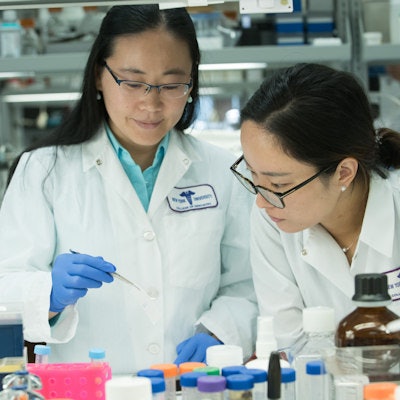
A newly developed topical gel that targets a major driver of periodontitis may prevent and treat gum disease, according to a new animal study published on September 20 in Cell Reports. Since no similar treatments exist, the gel could pave the way for noninvasive, at-home gum disease treatment.
The new study focuses on the use of succinate, a molecule produced during metabolism, which is thought to treat gum disease by inhibiting inflammation and preventing dysbiosis and periodontal bone loss. The study was conducted in mice and used human cells and plaque samples.
"Our study reveals succinate's effect on periodontitis pathogenesis and provides a topical treatment for this disease," wrote the authors, led by Dr. Xin Li of New York University (NYU) College of Dentistry.
To determine the connection between the succinate receptor and the components of gum disease, mice were genetically altered to inactivate the succinate receptor. Mice with gum disease that had their succinate receptor inactivated had lower levels of inflammation in their gum tissue and blood, as well as less bone loss. Also, mice that didn't have inactivated receptors had a more significant imbalance of oral bacteria, they wrote.
In fact, when extra succinate was given to both animal groups, mice with inactivated receptors were protected against inflammation and increases in unhealthy bacteria and bone loss, while gum disease worsened in the other mice, according to the study.
To determine whether blocking the succinate receptor could improve periodontitis, the authors developed a gel formula. When the gel was tested on human gum cells in the lab, inflammation and processes that lead to bone loss were reduced.
 Vials containing a topical gel that was created as a noninvasive treatment for gum disease. Image courtesy of Dr. Yuqi Guo.
Vials containing a topical gel that was created as a noninvasive treatment for gum disease. Image courtesy of Dr. Yuqi Guo.Furthermore, mice with gum disease experienced less local and systemic inflammation and bone loss in a matter of days when the gel was applied to their gums. One test showed that when the gel was applied to their gums every other day for four weeks, the bone loss they experienced was half that compared to the mice that didn't receive the gel, they wrote.
Building on prior research
Previous research has found an association between succinate and gum disease. Higher succinate levels are linked to heightened levels of inflammation.
In 2017, the same authors of the current study discovered that high levels of succinate activate the succinate receptor 1 (SUCNR1) and stimulate bone loss, indicating that the receptor may be an effective target for the potential treatment of periodontitis. The research was supported by the National Institutes of Health, and the researchers were awarded a $224,000 National Institute of Dental and Craniofacial Research grant to develop the gel.
To better understand the link between succinate and gum disease, the authors examined samples of dental plaque collected from people and plasma samples from mice. Then, metabolomic analyses were conducted to confirm that succinate levels were higher in people and mice with periodontal disease versus those with healthy gums. Also, in human and mouse gums, the succinate receptor was expressed.
 NYU College of Dentistry researchers and study authors Dr. Xin Li (left) and Dr. Yuqi Guo (right) work on a succinate preparation in the lab. Image courtesy of NYU Dentistry.
NYU College of Dentistry researchers and study authors Dr. Xin Li (left) and Dr. Yuqi Guo (right) work on a succinate preparation in the lab. Image courtesy of NYU Dentistry.There were several limitations in the new study. Though the study shows SUCNR1 expression in the human periodontium, it is not clear whether its expression is upregulated in patients with periodontitis and directly contributes to disease manifestation, the authors wrote.
To further their research, they are conducting animal studies to determine the appropriate dosage and timing for applying the gel, as well as its toxicity. Ultimately, they hope to develop a gel and oral strip that can be used at home by people who have gum disease or who are at risk of developing it in addition to a stronger, slow-release formula that dentists can apply to gum disease pockets, according to the university.
In the future, more studies should be conducted using tissue samples from large groups of individuals with and without gum disease, they wrote.
"Treatment with a SUCNR1 antagonist reduced formation of a dysbiotic microbiome, periodontal inflammation, and bone loss induced by oral inoculation of periodontal pathogens," Li and colleagues wrote.
Disclosure: Drs. Li and Deepak Saxena of the department of molecular pathobiology at NYU College of Dentistry are the cofounders of Periomics Care, an early-stage biotechnology company within NYU Dentistry.




















